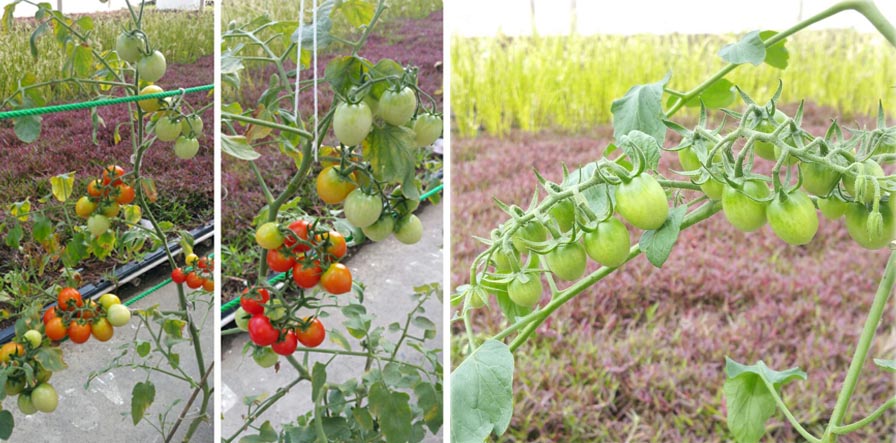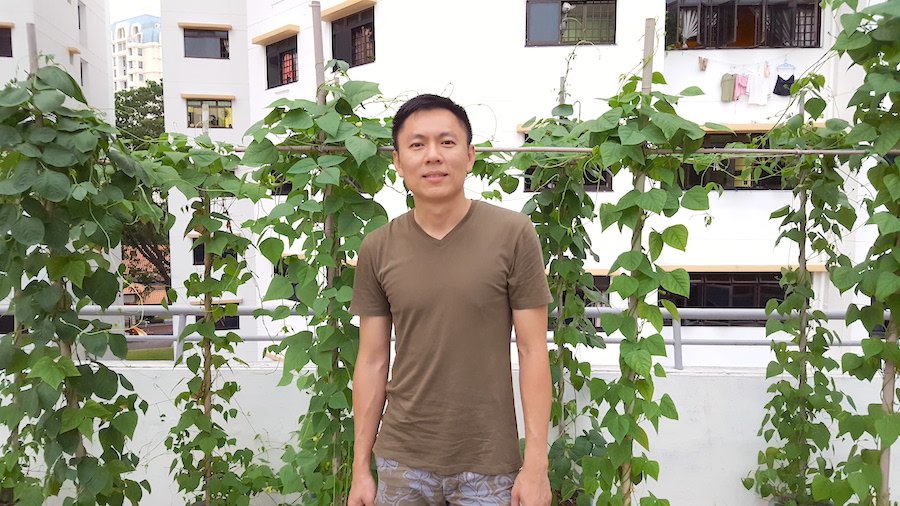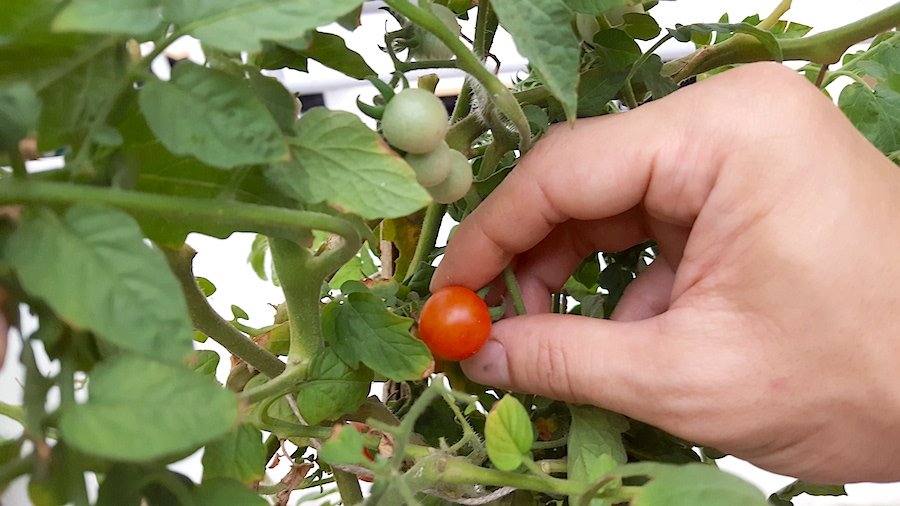This is the first of an ongoing series on growing edible plants successfully in Singapore with urban farmers who have consistently grown a particular vegetable well. I speak with Desmond Tan about his preferred method of how to grow tomatoes in Singapore.

When I first visited Desmond Tan at Our Kampong Farm, a rooftop community garden where he is an active resident volunteer, I learned that he grows tomatoes really well, a crop he has grown over the last three years. Those who have tried growing tomatoes in Singapore know that it is not the easiest plant to grow in a tropical climate. In this post, he shares with me his process of soil preparation and useful tips that every home urban farmer can use. While he started out with hydroponic tomatoes, which he says is more straightforward and free of pests, he now grows in soil, which is admittedly much more tricky and more expensive.
How To Grow Tomatoes in Singapore
Desmond rarely buys tomato seeds, and instead uses seeds from cherry tomatoes that he buys from the supermarket. His most successful crop came from a Holland-grown brand of tomatoes – a variety called Sweet Pearl, which gave him sweet, bountiful bunches of cherry tomatoes, he lamented that he has difficulty finding it these days.
Two months prior to transplanting his tomato seedlings to the pots where it is to grow, he prepares the soil with four free inputs:
- Very finely ground eggshells for calcium
- Coffee Grounds for nitrogen
- Okara (by-product from soy bean drink stall) for nitrogen
- Banana peels (by-product of goreng pisang, or fried banana, stall) for potassium
Desmond liberally adds these four items to pots of soil and covers it with plastic trays, leaving aside for two months without touching it, watering it only once – when he first prepares the soil. He says that acidity is required in order to extract calcium from eggshells, so he mixes coffee grounds very thoroughly with finely ground eggshells. Banana peels take a longer time to break down, and it doesn’t matter that the banana peels are not fully broken down, he says. After a two month wait, it is finally ready to transplant your tomato seedlings into the pots. Every fortnightly, he feeds the plants with a teaspoon of pelletised Bioplus 8-8-8 (N-P-K) fertiliser from World Farm for a medium sized pot. He grows an indeterminate variety of tomatoes and uses string to offer it strong support.
So what about tomato pests?
While whitefly is a common pest, Desmond leaves them alone. In the past, his peers at the community garden used to spray neem oil but they have stopped doing so, and decided to cull their tomato plants after two rounds of harvests – or around 4 months time. There are some exceptions, for example, there are three strong plants that have no pests and continue to produce small tomatoes.
Wish to volunteer with Our Kampong Farm? Desmond is looking for volunteers, and he is open to receiving messages on Facebook!
I hope you found his tips on how to grow tomatoes in Singapore useful. Best of luck! One of my favourite tomato varieties is Black Sea Man, an heirloom beefsteak variety that actually does well in our hot and humid climate! Have any additional tips on growing tomatoes? Share it in the comments section below!





6 Comments
When is the best time to plant?
In tropical and subtropical climates, anytime is a good time. For temperate climates, it’s best to check the seed packet as some fare better in cooler weather.
What is the proportion of the 4 inputs i.e. egg shells, coffee grounds, okra and banana peel mentioned above?
Can I omit okra ?
Hi Regina! He didn’t say, but he applies it liberally. You can skip the okara because it is not easy to get access to okara. Another option you can consider is fertiliser like Italpollina (4-4-4) and Phenix (6-8-15) which you get from Far East Flora affordably. Buy both and feed your plants with the former when the plant is young, and switch over to the latter when you wish to promote flowering and fruiting.
MAARRRGHHH… My tomato plants are so tall, I’ve trimmed suckers religiously, and yet. No fruits. Flowers are pretty tiny and they die off quickly. No fruit or tomatoes as of yet. Grrrg…! Wondering if I should hard prune them down, and improve the soil like Desmond’s recommendation. I have already added a ton of calcium via egg shell powder.
Sounds like you need to add more bonemeal and potassium to your soil, along with that magic compost from Jeremy!